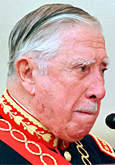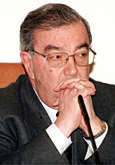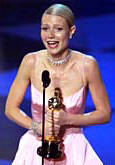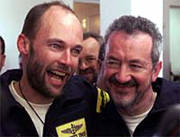NATO continued to bomb Yugoslavia. Scorecard: Significant damage to the Serbs' air defenses and command centers, but not to Serb ground forces, which are escalating their assaults on ethnic Albanians in Kosovo. As of Friday morning, NATO had lost no pilots. Stress points: 1) President Clinton told the Serbian people their leaders are to blame for dragging them into a disastrous war, but so far the Serbs are rallying behind their leaders and blaming NATO. 2) Congress and the American public are cautiously supporting the bombing, but not the use of U.S. ground troops. 3) Italy and Greece suggested resuming peace talks with the Serbs, but U.S. officials say the allied coalition is holding firm. 4) Russia and China are protesting loudly but aren't matching their harsh words with deeds. The naive anti-bombing spin: NATO's bombs will never get the Serbs to accept NATO's peace plan. The pro-bombing spin: NATO will soon attack the Serbs' tanks and troops directly, crippling their ability to slaughter the Kosovars. The sophisticated anti-bombing spin: That's when the Serbs will start shooting down the allies' planes. (For the overseas' press reaction to the Kosovo airstrikes see "International Papers" and "The War in Kosovo.") (3/26/99)

Britain's highest court issued a new ruling on the fate of Chilean Gen. Augusto Pinochet. Spain is seeking his extradition from Britain on charges of murder, torture, kidnapping, and conspiracy. Pinochet wants to return to Chile, where he is immune from prosecution. The court ruled that 1) Pinochet can be extradited but 2) only for crimes that are illegal in both Britain and Chile. Since Britain didn't sign the global treaty on crimes against humanity until 1988, this means Pinochet's alleged pre-1988 crimes--nearly all the charges against him--can't be used as a basis for extraditing him. Both sides are happy: Pinochet's supporters now expect him to escape extradition, while human rights activists hail the ruling as a sign that dictators who have committed more recent crimes can be extradited. (3/26/99)
The forewoman of the Lewinsky grand jury said she was willing to indict President Clinton for perjury. The good news for Clinton: She voted for him, attended a Democratic gala in his honor in 1997, says, "I absolutely love him" (in part because he has blacks and other minorities on his staff), doubts he committed obstruction of justice, and doesn't think he should have been removed from office. The bad news: She says that he committed perjury (by denying that he had sex with Monica Lewinsky) and that his sexual exploitation of Lewinsky was "awful." She also says 1) Independent Counsel Kenneth Starr was just doing his job; 2) she felt maternal sympathy for Lewinsky; and 3) the grand jurors were suspicious of Linda Tripp and annoyed by her "self-righteousness."(3/26/99)

Russian Prime Minister Yevgeny Primakov canceled his visit to the United States. En route to meet with President Clinton and leaders of the International Monetary Fund, Primakov turned his plane around and went back to Moscow because NATO decided to bomb Yugoslavia, despite Russia's vigorous opposition. The pessimistic spin: This marks a "significant souring in the American-Russian relationship" and "could poison discussions" on arms control, which are more important than Yugoslavia. The optimistic spin: As long as we're holding the purse strings and Primakov is hard up for cash, he'll be back. The in-between spin: Canceling the visit offered both sides a graceful way to avoid a face-to-face fight over Kosovo. (3/24/99)
Dr. Jack Kevorkian is botching his murder trial. The prosecution's case relies on a 60 Minutes video that shows Kevorkian giving a lethal injection to a terminally ill man after obtaining the man's consent. Kevorkian, acting as his own attorney, is arguing that it was a mercy killing. The judge has tried in vain to explain to Kevorkian that mercy killing is not a valid defense against a murder charge under Michigan law. The spins on Kevorkian's courtroom performance, in order of ascending irony: 1) He's nuts. 2) He doesn't understand the difference between morality and the law. 3) He's committing legal malpractice. 4) He's killing himself. 5) He's unfit to make the legal decisions by which he's killing himself. 6) He'll escape conviction thanks to jury nullification yet again. (3/24/99)
Jesse Jackson won't run for president in 2000. Jackson's spin: He can do more good by pressuring Wall Street to invest in poor communities. Other spins: 1) He decided he can't win. 2) His absence helps Vice President Al Gore by clearing the field. 3) His absence helps former Sen. Bill Bradley, D-N.J., by freeing up blacks and liberals sympathetic to Bradley's left-wing platform. 4) Gore talked Jackson out of running. 5) On Gore's behalf, Clinton talked Jackson out of running. 6) It doesn't matter much, since Gore has already wrapped up the nomination. (3/24/99)

Shakespeare in Love shocked movie pundits by winning the Academy Award for Best Picture. Saving Private Ryan, which had been expected to win, instead received four lesser awards, including best director (Steven Spielberg). Shakespeare won seven awards, including best actress (Gwyneth Paltrow). The happy spin: Love beats war. The half-cynical spin: Comedy beats tragedy. The completely cynical spin: Disney-Miramax's publicity campaign for Shakespeare beat DreamWorks-Paramount's publicity campaign for Private Ryan. The ceremony's political controversy was a lifetime achievement award for Elia Kazan, a director revered for his films but ostracized by much of Hollywood for outing fellow Communists during the McCarthy era. (3/22/99)

A Swiss psychiatrist and his British co-pilot completed the first round-the-world balloon trip. Their 20-day odyssey achieved aviation's most elusive goal, beating more famous balloonists such as Steve Fossett and Richard Branson. Their prize is $1 million--half the cost of their balloon. While applauding co-pilot Brian Jones for overachieving, the media concluded in retrospect that the pilot, Bertrand Piccard, had been destined for greatness, since his grandfather was the first man to reach the stratosphere (in a balloon in 1931) and his father had attained the oceans' lowest depth (35,000 feet). The spins: 1) The trip was a triumph of human ingenuity, skill, and endurance. 2) It was a triumph of meteorological, communications, and auto-piloting technology, which babysat the crew. 3) It was a triumph of lucky weather. (For more on the species, see David Plotz's 1998 piece "The (Not Yet) Around-the-World Balloonists") (3/22/99)
Duke, Connecticut, Michigan State, and Ohio State reached the NCAA basketball tournament's final four. Duke is the clear favorite to win it all, having won 31 straight games. The Cinderella teams--Gonzaga, Southwest Missouri State, and Miami of Ohio--were wiped out in the last two rounds, leaving no true underdogs. Many fans are cheering Connecticut because the school has earned its first final four appearance, having choked in the tournament in recent years. Similarly, Michigan State is making its first such appearance in two decades. The best story belongs to Ohio State, which was 8-22 last year and is the first team ever to reach the final four without having qualified for the tournament in the previous year. (3/22/99)
